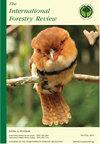《刚果民主共和国森林治理失败的政治:35年政治对抗的教训
IF 0.9
4区 农林科学
Q2 FORESTRY
引用次数: 1
摘要
刚果民主共和国的森林治理改革一直被世界银行和政治精英等强大行为者的利益所主导。最强大的国际行为体利用奖励/抑制和信息来巩固其影响力。强大的国际行为体加剧了刚果民主共和国森林治理的危机。刚果民主共和国的政治家、军事和行政官员在政治动荡时期诉诸“狡猾的政府”策略来获得捐助者的支持或维护他们的非正式利益。政治混乱的背景使民间社会组织能够定位自己,并成为刚果民主共和国森林治理进程的关键行动者团体之一。在刚果民主共和国(DRC)促进林业部门的良好治理是20世纪80年代中期国际组织发起的政策改革的主要组成部分之一。本文分析了20世纪80年代中期至2020年期间刚果民主共和国林业部门的“善治”概念,并强调了最近森林政策改革的历史。从经验的角度来看,我们的分析建立在对政策文件和实地观察的广泛审查,以及对参与森林政策改革或目睹其实施情况的行为者的采访之上。本文还描述了参与这些改革的关键行为者,并调查了其中一些人之间形成的联盟,以影响该国的林地治理。这篇论文表明,国际组织经常在促进刚果民主共和国林业部门的“善治”方面发挥决定性和侵入性的作用。他们的强烈参与有时被视为干涉,加剧了而不是缓解了治理危机。在某些情况下,政治家、军方和行政官员利用政治和安全动荡作为替罪羊,从刚果民主共和国森林治理失败和相关的一切照旧中获益。本文章由计算机程序翻译,如有差异,请以英文原文为准。
The Politics of Forest Governance Failure in the Democratic Republic of Congo (DRC): Lessons from 35 Years of Political Rivalries
HIGHLIGHTS Forest governance reforms in DRC have been dominated by the interests of powerful actors, such as the World Bank and political elites. The most powerful international actors use incentives/disincentives and information to consolidate their influence. Powerful international actors have exacerbated the crisis of forest governance in DRC. Politicians, military and administrative officers in DRC resort to ‘cunning government’ strategies to obtain support from donors or assert their informal interests in times of political unrest. The context of political disorder allows civil society organizations to position themselves and become one of the key actor groups of forest governance processes in DRC. SUMMARY The promotion of good governance in the forestry sector in the Democratic Republic of Congo (DRC) was one of the major components of the policy reforms initiated by international organisations in the mid-1980s. This paper analyses concepts of ‘good governance’ in the forestry sector in the DRC between the mid-1980s and 2020 and highlights the recent history of forest policy reforms. From an empirical perspective, our analysis builds both on an extensive review of policy documents and field observations, as well as interviews with actors who have been involved with forest policy reforms or seen how they were implemented. The paper also describes the key actors involved in those reforms and investigates the coalitions formed between some of them to influence the forestland governance in the country. The paper demonstrates that international organisations have often played a decisive and intrusive role in the promotion of ‘good governance’ in the DRC forestry sector. Their strong involvement is sometimes seen as interference and has aggravated rather than alleviated the governance crisis. In some cases, politicians, military and administrative officers have used political and security unrest as a scapegoat to benefit from forest governance failure and the related business-as-usual in the DRC.
求助全文
通过发布文献求助,成功后即可免费获取论文全文。
去求助
来源期刊

International Forestry Review
农林科学-林学
CiteScore
2.50
自引率
6.20%
发文量
29
审稿时长
>36 weeks
期刊介绍:
The International Forestry Review is a peer-reviewed scholarly journal that publishes original research and review papers on forest policy and science, with an emphasis on issues of transnational significance. It is published four times per year, in March, June, September and December. Special Issues are a regular feature and attract a wide audience. Click here for subscription details.
 求助内容:
求助内容: 应助结果提醒方式:
应助结果提醒方式:


